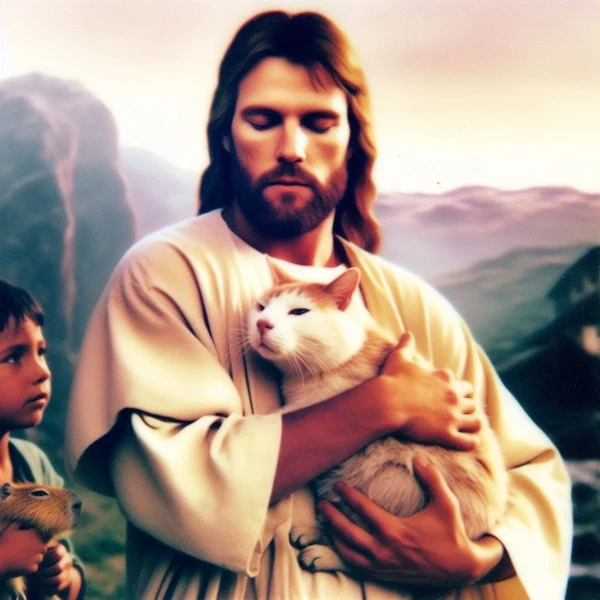Hello friends, my neighbor @HadalZoneShill has yet to post the weekly thread so I shall do so instead. The readings this week focus greatly upon the idea of heaven as a great feast or banquet and deal with who will be accepted into heaven and how you should attempt to get there as well. Here they are:
First Reading
On this mountain the LORD of hosts
will provide for all peoples
a feast of rich food and choice wines,
juicy, rich food and pure, choice wines.
On this mountain he will destroy
the veil that veils all peoples,
the web that is woven over all nations;
he will destroy death forever.
The Lord GOD will wipe away
the tears from every face;
the reproach of his people he will remove
from the whole earth; for the LORD has spoken.
On that day it will be said:
"Behold our God, to whom we looked to save us!
This is the LORD for whom we looked;
let us rejoice and be glad that he has saved us!"
For the hand of the LORD will rest on this mountain.
Isaiah 25:6-10
Second Reading
Brothers and sisters:
I know how to live in humble circumstances;
I know also how to live with abundance.
In every circumstance and in all things
I have learned the secret of being well fed and of going hungry,
of living in abundance and of being in need.
I can do all things in him who strengthens me.
Still, it was kind of you to share in my distress.
My God will fully supply whatever you need,
in accord with his glorious riches in Christ Jesus.
To our God and Father, glory forever and ever. Amen.
Philippians 4:12-14, 19-20
Gospel
Jesus again in reply spoke to the chief priests and elders of the people
in parables, saying,
"The kingdom of heaven may be likened to a king
who gave a wedding feast for his son.
He dispatched his servants
to summon the invited guests to the feast,
but they refused to come.
A second time he sent other servants, saying,
'Tell those invited: "Behold, I have prepared my banquet,
my calves and fattened cattle are killed,
and everything is ready; come to the feast."'
Some ignored the invitation and went away,
one to his farm, another to his business.
The rest laid hold of his servants,
mistreated them, and killed them.
The king was enraged and sent his troops,
destroyed those murderers, and burned their city.
Then he said to his servants, 'The feast is ready,
but those who were invited were not worthy to come.
Go out, therefore, into the main roads
and invite to the feast whomever you find.'
The servants went out into the streets
and gathered all they found, bad and good alike,
and the hall was filled with guests.
But when the king came in to meet the guests,
he saw a man there not dressed in a wedding garment.
The king said to him, 'My friend, how is it
that you came in here without a wedding garment?'
But he was reduced to silence.
Then the king said to his attendants, 'Bind his hands and feet,
and cast him into the darkness outside,
where there will be wailing and grinding of teeth.'
Many are invited, but few are chosen."
Matthew 22:1-14
I've gone to 2 masses so far with different homilies, but they spoke on the same things so I think the message is quite important. In the Gospel, Jesus is very clear about what he is describing in the very first line, "the kingdom of heaven may be likened to a king who gave a wedding feast for his son." Who is invited is what is more important to this, but it is also important to note what is said about heaven itself as well. This ties into the first reading, heaven is a feast with rich food and choice wines or a wedding feast. The king first invites specific guests who I believe are meant to be the old Jews. The ones who rejected his message were the ones who were living in the lifetime of Jesus or before Jesus who, even after receiving his invitation to come into heaven, refused him as the savior and so they were sentenced to Heck for eternity. It is important to make the distinction here that these are not the modern day Jews or at least not all of them as they still have a chance to convert (they are still alive after all) and may still have a chance to do so after they die as well and simply being a Jew does not mean you necessarily renounce Christ as many are born into their faith as a Jew and don't seek out further information than that. Next, everyone, good and bad alike, are allowed into heaven. This is the new covenant which includes not only Jews but also Gentiles, even those who have sinned as they may repent for their sins and be saved. Jesus, in his time, walked among both righteous men as well as prostitutes and tax collectors and they were all accepted by him. Finally, the king finds one among those already in his feast who is not worthy to be there; I think this is someone who entered into the kingdom of heaven but still holds some belief that is sinful or is unwilling to give up some sin he has committed. This person is thrown out of heaven to a place where there will be wailing and gnashing of teeth. Through the Gospel, we can see who will be allowed into heaven, but the readings don't stop there as the second reading gives us insight into how we can become worthy to get into heaven. God will supply for us whatever we need and it is through God that we should find our way into heaven if we only ask for his help. Paul states that he has been in all circumstances and has persevered because God helped him do so and because Paul has been able in any situation, there should be no excuse regardless of where we are in life as God will provide for us whatever we need.
What do you guys think of the readings? Was my writeup apt? Is there something I missed or misinterpreted? !catholics discuss






.webp?h=8)



Jump in the discussion.
No email address required.
Our reader read a verse from the Psalm instead of this and it threw me off. It's over for Ordinary Timecels
Jump in the discussion.
No email address required.
oh you mean the responsorial psalm? I thought about putting that in as well, but the past threads didn't so I didn't. Priests don't usually reference it anyways so its probably fine not to. Did your homily mention it all? asking what your denomination is may be a better question actually.
Jump in the discussion.
No email address required.
Maronite, but I was visiting a Roman Catholic Church and it was their saints feast day so it was a little different I think
Jump in the discussion.
No email address required.
I've never heard of Maronites, do you know how they differ from catholicism?
Jump in the discussion.
No email address required.
We are fully Catholic, just not Roman Catholic. Complete communion with the Holy See but our priests can be married. We follow the same readings but I'm not sure if the feast day changed some things at Roman Catholic Church
Jump in the discussion.
No email address required.
This is the correct way to Christian
Jump in the discussion.
No email address required.
More options
Context
More options
Context
More options
Context
More options
Context
More options
Context
More options
Context